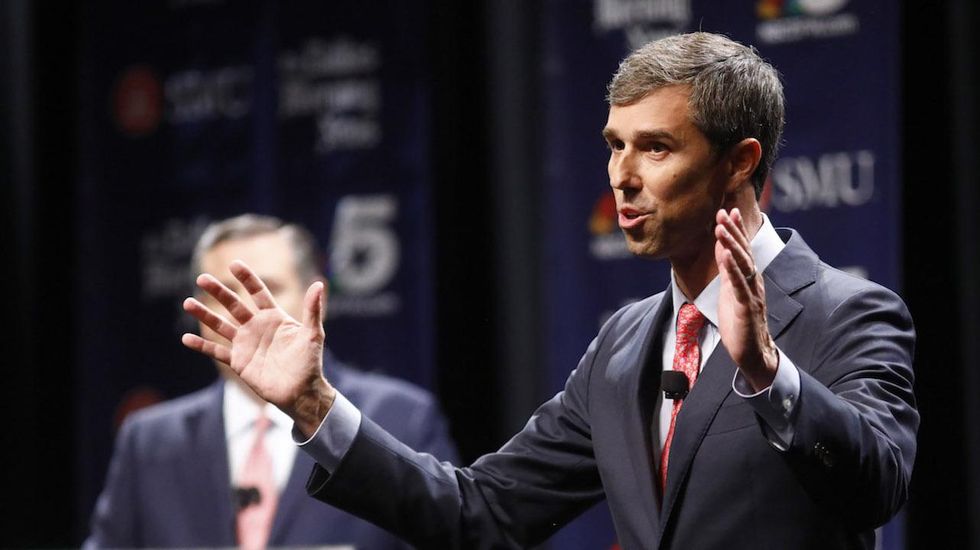
Beto O'Rourke denied attempting to leave the scene of a 1998 drunk driving accident when asked about the incident during a debate with Sen. Ted Cruz at Southern Methodist University in Dallas. (Tom Fox/Pool/Getty Images)

Texas Senate candidate Beto O'Rourke (D) received four Pinocchios in a post-debate analysis by the Washington Post following his first face-to-face debate against incumbent Sen. Ted Cruz (R).
The newspaper's fact-check focused on O'Rourke's denial that he tried to flee the scene of an accident that he caused while driving drunk 20 years ago. Police records obtained from the incident indicate otherwise.
Friday's debate at Southern Methodist University in Dallas was the first of three debates scheduled between the candidates.
O'Rourke has admitted some past brushes with the law including his DWI on Sept. 27, 1998, which occurred in the early morning hours after his 26th birthday.
What he had not shared previously was that he had caused an accident and tried to leave the scene, as indicated in police reports obtained previously by the Houston Chronicle and San Antonio Express-News.
During the debate, O'Rourke flat-out denied that he had tried to leave the scene of the accident.
"I did not try to leave the scene of the accident," O'Rourke said in what came across as a well-rehearsed answer. "Though driving drunk, which I did, is a terrible mistake for which there is no excuse or justification or defense and I will not try to provide one."
Then, he launched into a long parlance on second chances and how mistakes shouldn't define a person for the rest of their life.
Cruz said he would not get into O'Rourke's personal life. Instead, he moved the discussion to O'Rourke's sponsorship of a 2009 resolution to debate the legalization of narcotics when he served on the El Paso City Council.
At about 3 a.m., Sept. 27, 1998, a witness told police, according to the arrest report, that he saw a Volvo driving at a “high rate of speed” in a 75-mph zone along Interstate 10 in Anthony, Texas. Anthony is a suburb of El Paso near the New Mexico border. The witness told the officer that the Volvo, driven by O’Rourke, had passed him just before it “lost control and struck a truck traveling the same direction.” After hitting the truck, the Volvo careened across the center median before it came to a halt facing oncoming traffic.
O’Rourke then reportedly tried to leave the scene but he was stopped by the witness who turned on his overhead lights to try to stop him and warn the oncoming traffic, the report said.
The officer reported that O’Rourke had “glossy eyes and breath smelled of alcohol beverage.”
“I then asked the defendant to step out of the vehicle, upon doing so the defendant almost fell to the floor,” the officer wrote in his report.
He added that he observed O’Rourke having “extreme difficulty maintaining his balance.”
O'Rourke's blood alcohol level was recorded well above the legal limit at 0.136 and 0.134. At the time, the legal limit was 0.10. A few months later, it was reduced to 0.08.
The police reports showed some inconsistencies, including the color of the Volvo and the direction O'Rourke was traveling, but it twice stated that the witness described O'Rourke as trying to flee the scene of the accident.
He posted bail and was released from jail. The charges were later dismissed after he completed a court-approved diversion program, according to the Chronicle.
After citing all the evidence, the Post's fact-checker was strikingly clear in its assessment:
The police reports show not only that O’Rourke was highly intoxicated but that a witness to the crash said he tried to leave the scene.
O’Rourke was so drunk that he could barely get out of the car without falling, so perhaps he would not have gotten far — or he was simply confused. Perhaps in his memory, O’Rourke believes he did not try to leave. But, given his blood alcohol content at the time of the crash, O’Rourke’s memory 20 years after the fact is not nearly as credible as the police reports written just hours after the crash.
O’Rourke could have dodged the question during the debate or he could have said his memory of the night is not clear. Instead, he chose to dispute the factual record. We also believe in second chances, and O’Rourke should revise his answer if given another opportunity. In the meantime, he earns Four Pinocchios.
Cruz and O'Rourke will square off again Sept. 30 in Houston. The town hall-style debate will be focused on domestic policy.
Watch the debate in its entirety: